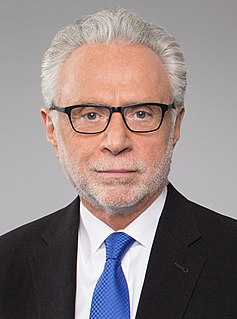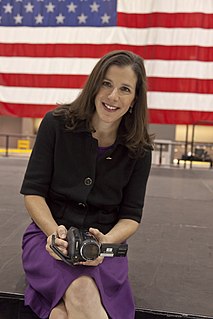A Quote by Wolf Blitzer
Six days after 9/11 George W. Bush visited a mosque and said quote, "Islam is peace."
Related Quotes
We've got to reach out to Muslim countries.We've got to have them be part of our coalition. If they hear people running for president who basically shortcut it to say we are somehow against Islam, that was one of the real contributions, despite all the other problems, that George W. Bush made after 9/11 when he basically said after going to a Mosque in Washington, we are not at war with Islam or Muslims.
If they hear people running for - president... despite all the other problems that George W. Bush made after 9/11 when he basically said after going to a mosque in Washington, "We are not at war with Islam or Muslims. We are at war with violent extremism. We are at war with people who use their religion for purposes of power and oppression."
George W. Bush, another Republican who I probably didn`t agree with on much, right after 9/11 went to a mosque and joined with some Muslim leaders and said that, look, you know, we`re not going to tolerate any backlash. These people who attacked our country are criminals and they`re terrorists, and they might try to profess a religion, but they definitely violate the principles of that religion.
When George Bush Senior [George HW Bush] was getting his alliance together to go into Iraq - to kick the Iraqis out of Kuwait - he rang me up. I was very close to George Bush Senior; I got to know him well as Vice President to Ronald Reagan. And George rang me up and said, "Oh, Bob," he said, "I'm having trouble with Brian [Mulroney]." He said, "He's got a big wheat trade with Iraq, and he doesn't want to upset that." I said, "You leave it with me."
Few knew in 2000 that George W. Bush was going to end up with neoconservatives all over the place. Once 9/11 happened, I think it's fair to say that some neocons have had an enormous influence. The whole solution to every problem was to go after Iraq. This had been a neoconservative mantra for ten years. Bush certainly sees himself as having been given an endorsement. He was asked why Donald Rumsfeld,Condoleezza Rice, and Paul Wolfowitz have been promoted, these people who led us into the debacle in Iraq. Bush said there was accountability-it was the election. So there we are.
There are two major peace agreements. One is a comprehensive peace agreement that was consummated by the extremely beneficial intersession of the George Bush administration, who called on John Danforth, the former senator from Missouri, to negotiate a peace agreement after eight years during which President Clinton did not want to promote peace in the Mideast - I mean, in Sudan. And that's holding so far.
There's been a lot of talk about how bad the reporting was, particularly with the George W. Bush Administration after 9/11. The general assumption, which I think is a valid one, is that a lot of the major media were on their heels a little bit and prone to share the grief of the nation and to give Bush all the support it could.
Both Presidents George Bush and Barack Obama pursued policies of regime change after 9/11 - with Bush removing al-Qaida's safe haven in Afghanistan and the sadistic anti-American dictator Saddam Hussein in Iraq - but Obama took it a step further and disregarded regional stability as a guiding factor for U.S. policy.
I like something about George W. Bush. A lot. After spending more than a decade having almost physiological-chemical reactions anytime I saw him, getting the heebie-jeebies whenever he spoke - after being sure from the start that he was a Gremlin on the wing of America - I really like the paintings of George W. Bush.






























